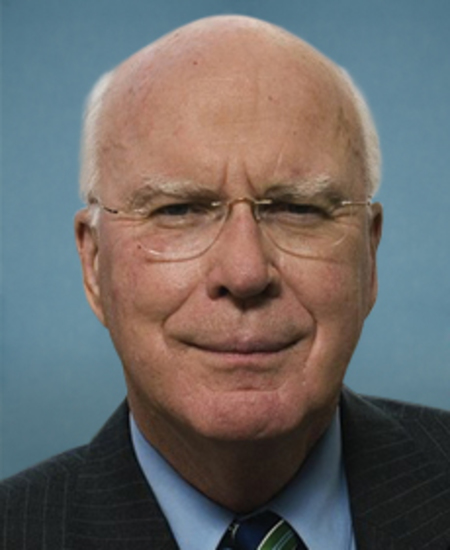Sen. Patrick J. Leahy

Sen. Patrick J. Leahy
Vermont
Democrat

100%
2022 Score
100%
Average Senate Democrat
98%
Lifetime Score
| Date | Key Vote | Vote |
|---|---|---|
Dec
22
2022
|
Consolidated Appropriations Act of 2023 This omnibus package provides a much needed increase in non-defense discretionary funding and critical investments in Medicaid, education, children's health and worker protection programs. After nearly 10 years, the National Labor Relations Board (NLRB) will finally receive a desperately needed boost in funding. The bill also includes increased funding for Registered Apprenticeships, projects authorized by the Infrastructure Investment and Jobs Act, and funds to implement the CHIPS and Science Act of 2022. It also includes the Pregnant Workers Fairness Act and supplementary funding for the 9/11 World Trade Center Health Program. |
|
Dec
01
2022
|
Rail Workers Sick Leave Unlike many workers, railroad employees are not guaranteed a single paid sick day. This resolution provides for seven days of sick leave for railroad employees. Rail workers are an integral part of the supply chain that makes America's economy run. As essential workers, they showed up day in and day out through the pandemic to keep our country moving forward. They deserve good wages, fair treatment and vital protections like paid sick leave. |
|
Nov
29
2022
|
Respect for Marriage Act This legislation is essential to securing marriage equality for same-gender couples, as well as the marriages of individuals of different races, ethnicities or national origin. The bill would enshrine into law the diversity and inclusivity of the US. Marriages, whether same-gender or interracial, or of people of different ethnicities and nationalities, would be protected under federal law, and states would be required to recognize them. The bill ensures that people who enter into same-gender marriages and marriages of different races, ethnicities and national origin have the certainty of equal treatment under the law and the dignity afforded other married couples regardless of where they live. |
|
Sep
29
2022
|
Lisa M. Gomez Assistant Secretary for the Employee Benefits Security Administration (EBSA) at the U.S. Department of Labor AFL-CIO supported the nomination of Lisa Gomez to be Assistant Secretary for the Employee Benefits Security Administration (EBSA) at the U.S. Department of Labor. Ms. Gomez is highly qualified for this position and her confirmation will ensure that EBSA’s important work protecting the retirement income security and health care of millions of working and retired Americans will continue. |
|
Aug
07
2022
|
Inflation Reduction Act CHIPS Act of 2022, which contains $52 billion for investment in domestic semiconductor funding, including $2 billion in funding for production of mature semiconductor technologies in the United States that are necessary to the production of cars, trucks, and agricultural equipment. Passage of this legislation will ensure access to critical technologies, increase national security, and remove impediments and roadblocks to the domestic production of future technologies. The need for this legislation has become apparent with the supply shortages that have plagued domestic production for the past several years. |
|
Jul
27
2022
|
CHIPS and Science Act CHIPS Act of 2022, which contains $52 billion for investment in domestic semiconductor funding, including $2 billion in funding for production of mature semiconductor technologies in the United States that are necessary to the production of cars, trucks, and agricultural equipment. Passage of this legislation will ensure access to critical technologies, increase national security, and remove impediments and roadblocks to the domestic production of future technologies. The need for this legislation has become apparent with the supply shortages that have plagued domestic production for the past several years. |
|
May
11
2022
|
Federal Reserve Nomination of Dr. Philip Jefferson The AFL-CIO supported the nomination of Dr. Jefferson, who likewise brings valuable experience and expertise to the Board. His research has focused on the effects of macroeconomic and monetary policy on employment, economic growth, poverty rates, and household finance, all of which are issues at the center of the Fed’s mandate. Dr. Jefferson has worked at the Federal Reserve twice, once as an economist in the Board’s monetary affairs division and later as a research assistant in the fiscal analysis department. |
|
May
10
2022
|
Federal Reserve Nominations of Dr. Lisa DeNell Cook The AFL-CIO supported the nomination of Dr. Cook, who is a highly respected economist, has served as an economic advisor to President Obama and held visiting appointments at four Federal Reserve Regional Banks. Dr. Cook would be the first black woman to serve on the board. |
|
Apr
07
2022
|
Nomination of Judge Ketanji Brown Jackson to the United States Supreme Court The AFL-CIO supported the confirmation of United States Judge Ketanji Brown Jackson to serve on the United States Supreme Court. Her nomination reflected President Biden’s promise to appoint highly qualified judges and to expand diversity on the federal bench. Throughout her professional life, most recently as a D.C. Circuit Court of Appeals Judge, Judge Jackson has demonstrated a strong commitment to equal justice under the law. |
|
Apr
05
2022
|
COVID Supplemental Appropriations Act Failure to enact this legislation would deny millions of people the vaccines and treatments that are necessary to save lives, keep children in schools, and allow workers to stay on the job. Unfortunately, the COVID threat remains – it still claims lives and takes a toll on our economy. |
|
Mar
30
2022
|
Nomination of David Weil to be Administrator of the Wage and Hour Division, DOL AFL-CIO supported the nomination of David Weil to be Administrator of the U.S. Department of Labor’s Wage and Hour Division. Mr. Weil is highly qualified for this position and has a proven track record of protecting workers. |
|
Mar
08
2022
|
Postal Service Reform Act This bill would bring financial stability to the Postal Service. First, it eliminates the mandate that the Postal Service pre-fund its retiree health care benefits decades in advance, a requirement asked of no other public or private agency. Second, it adopts private sector best practices by maximizing the integration of postal annuitants into Medicare – a program to which the Postal Service and its workers have contributed over $34 billion. Additionally, the legislation benefits the public by codifying the mandate to provide six-day mail delivery. |
|

